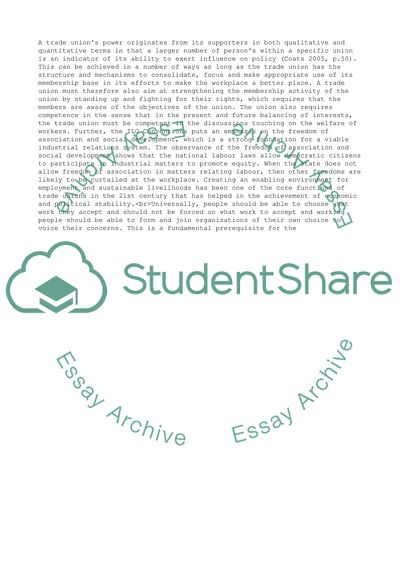Cite this document
(Role of Trade Unions in the 21st Century Essay Example | Topics and Well Written Essays - 2250 words, n.d.)
Role of Trade Unions in the 21st Century Essay Example | Topics and Well Written Essays - 2250 words. https://studentshare.org/management/1806173-do-you-agree-with-the-view-that-the-role-of-the-trade-union-remains-relevant-both-at-the-workplace-and-for-wider-employment-relations-concerns-in-the-21st-century
Role of Trade Unions in the 21st Century Essay Example | Topics and Well Written Essays - 2250 words. https://studentshare.org/management/1806173-do-you-agree-with-the-view-that-the-role-of-the-trade-union-remains-relevant-both-at-the-workplace-and-for-wider-employment-relations-concerns-in-the-21st-century
(Role of Trade Unions in the 21st Century Essay Example | Topics and Well Written Essays - 2250 Words)
Role of Trade Unions in the 21st Century Essay Example | Topics and Well Written Essays - 2250 Words. https://studentshare.org/management/1806173-do-you-agree-with-the-view-that-the-role-of-the-trade-union-remains-relevant-both-at-the-workplace-and-for-wider-employment-relations-concerns-in-the-21st-century.
Role of Trade Unions in the 21st Century Essay Example | Topics and Well Written Essays - 2250 Words. https://studentshare.org/management/1806173-do-you-agree-with-the-view-that-the-role-of-the-trade-union-remains-relevant-both-at-the-workplace-and-for-wider-employment-relations-concerns-in-the-21st-century.
“Role of Trade Unions in the 21st Century Essay Example | Topics and Well Written Essays - 2250 Words”. https://studentshare.org/management/1806173-do-you-agree-with-the-view-that-the-role-of-the-trade-union-remains-relevant-both-at-the-workplace-and-for-wider-employment-relations-concerns-in-the-21st-century.


